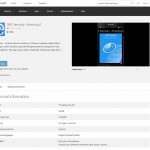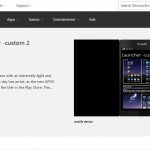Although it’s possible to use third-party apps stores safely and securely, the fact that scams do still occur in a variety of app stores shouldn’t be ignored. On Sunday, a threat was discovered by a user who posted the issue on our forum. The scam, located within the Windows Phone Store, advertised three fraudulent versions of Avast Mobile Security. These fake apps not only include the Avast logo, but also feature actual screenshots from AMS in their image galleries. Our fast-acting team has since blocked the pages and has labeled them as malicious.
Fake AMS apps collect personal data and redirect users to adware



If downloaded, these fake versions of AMS found on the Windows Phone Store pose a risk to users’ security. Here’s how they work:
- New Avast security: This app includes three control buttons which show only advertisements. Even without actively clicking on the ads, the app redirects users to additional adware.
- Avast Antivirus Analysis: Claiming to “protect your phone from malware and theft”, this malicious app runs in the background of victims’ devices once downloaded and collects their data and location.
- Mobile Security & Antivirus – system 2: Simply put, this is a paid-for version of “New Avast security” that forcibly leads users to adware.
The fun doesn’t stop there!
After doing some additional research, our malware analysts discovered that TT_Game_For_All, the same user that published the fake AMS apps, isn’t solely impersonating Avast. Instead, this cybercriminal has published a large collection of close to fifty apps, the majority of which cost around the equivalent of 1.99 USD. Certain apps even claim to be from other well-known companies such as Qihoo 360, APUS, and Clean Master.



Keep your eyes open for app store threats
This case goes to show that when it comes to mobile malware, it’s not only the Android platform that is vulnerable to attacks. Although Windows Phone devices aren’t currently as widely used as that of Android, it’s important to be careful regardless of the platform that you use. Finally, keep in mind that Google Play isn’t the only app store users should be paying attention to when it comes to avoiding mobile scams and threats — these threats can occur within any app store.
Follow Avast on Facebook, Twitter, YouTube, and Google+ where we keep you updated on cybersecurity news every day.

![]()








